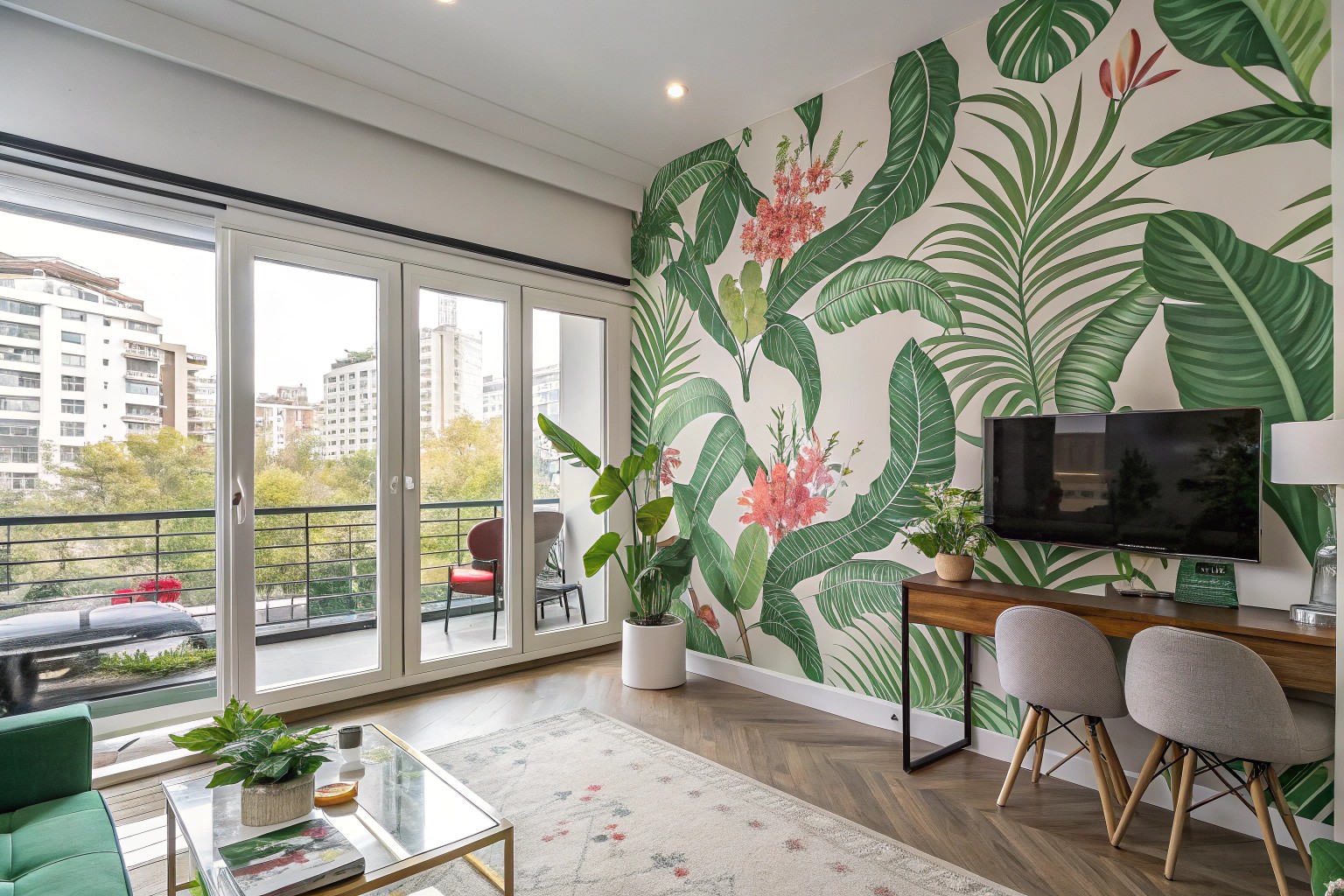Wallpaper has made a triumphant comeback in American interiors. No longer relegated to grandma’s dining room or outdated powder rooms, today’s wallcoverings offer sophisticated design solutions for contemporary spaces. As we move into 2025, wallpaper continues to evolve with exciting new applications, materials, and patterns that can dramatically transform any room.
The Revival of Wallpaper in Modern Design
The resurgence of wallpaper isn’t merely a passing trend but a significant shift in how we approach interior surfaces. Over the past few years, I’ve watched clients move from hesitation to enthusiasm when presented with wallpaper options. This revival has been driven by technological advancements in manufacturing, installation, and removal processes, making wallpaper more accessible and practical than ever before.
“Wallpaper is a top trend for 2023 as shoppers gravitate towards lively homes full of colour, pattern, texture, and optimism,” according to industry reports. This momentum has only strengthened heading into 2025, with 96% of top interior design experts agreeing that wallpaper remains a powerful design element.
Top Wallpaper Trends for 2025
The wallpaper landscape of 2025 reflects both innovation and a return to natural elements. Here are the dominant trends we’re seeing in today’s most stylish interiors:
Textured Wallcoverings
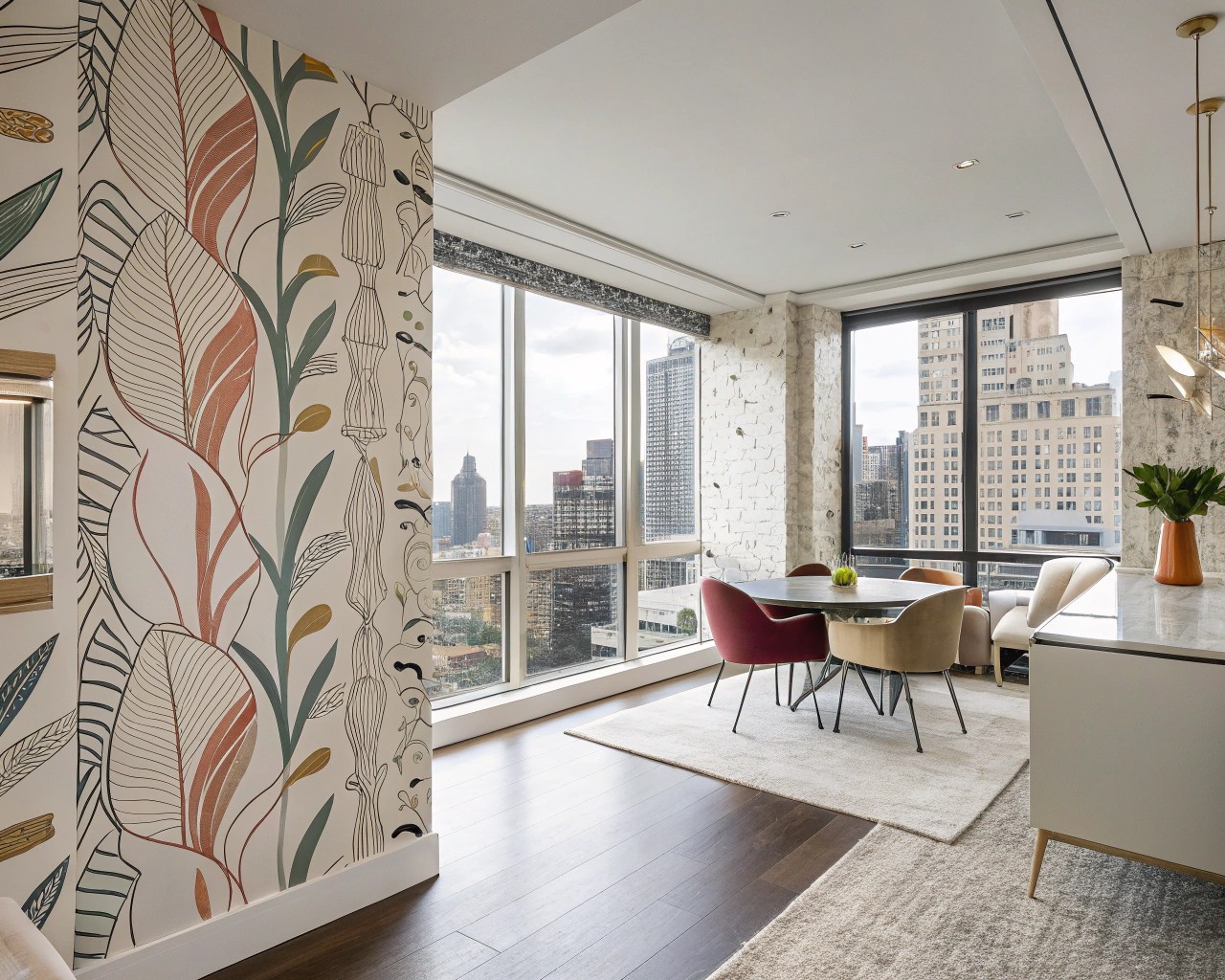
Natural materials have risen to prominence, with textured options like grasscloth, silks, and papers with brush strokes leading the way. “Grasscloth wallpaper isn’t going anywhere soon due to its natural texture and warm, inviting feel,” reveals designer Kate Marker. These textured wallcoverings add depth and dimension to any room while maintaining versatility across design styles.
In my practice, I’ve found that clients who were initially reluctant to use pattern often embrace texture as their first step into the wallpaper world. The subtle dimension creates interest without overwhelming the space.
Bold and Artistic Expressions
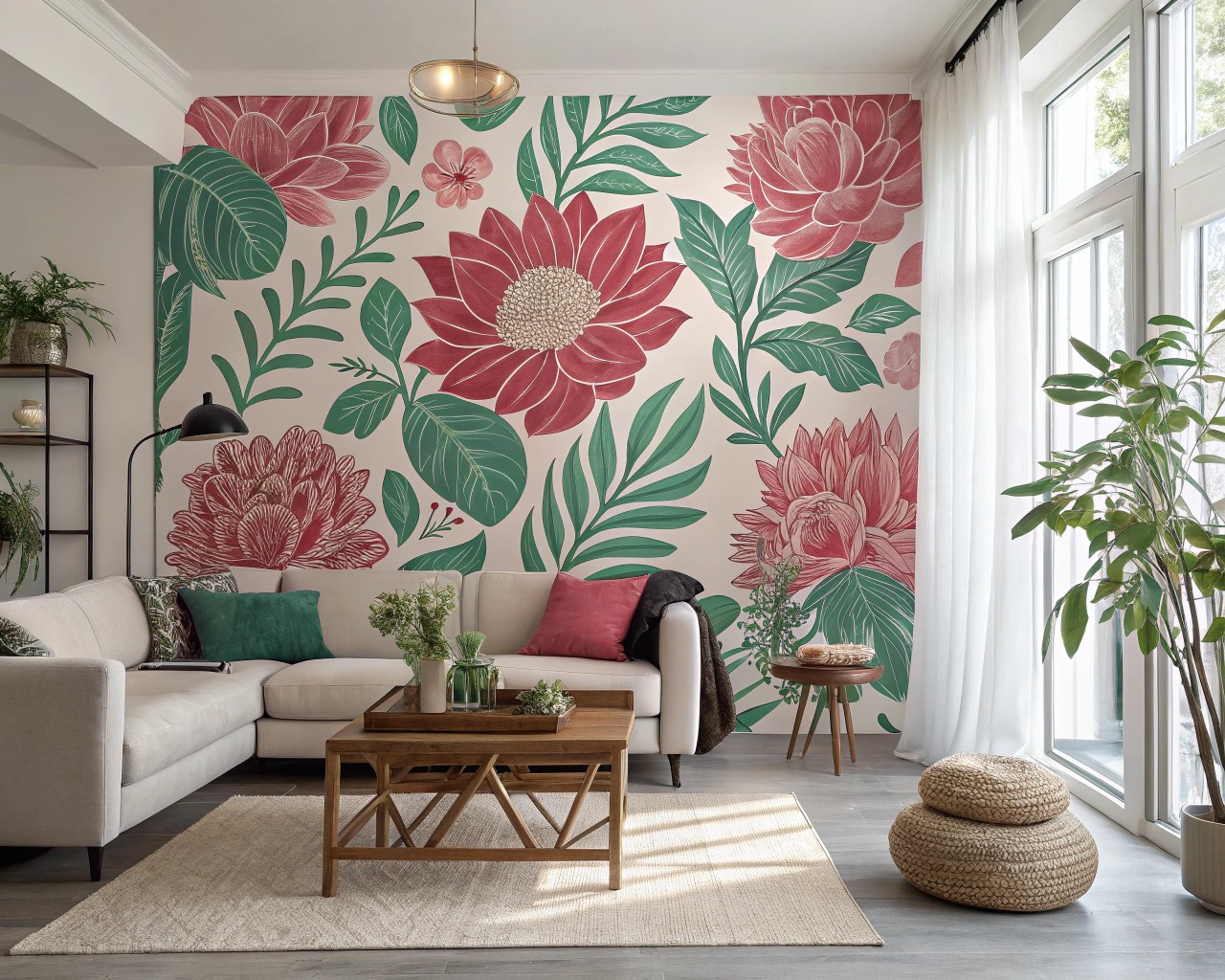
“Expect bold, maximalist patterns featuring oversized florals, abstract shapes, and even animal prints,” says designer Mina Lisanin. Abstract and artistic designs have become particularly popular for those seeking personalized spaces that reflect individuality.
One client recently transformed their home office with a dramatic abstract mural that became the visual anchor for the entire room. What began as an experiment with a single wall evolved into a complete design story that informed everything from furniture selection to accessories.
Nature-Inspired and Botanical Designs
Botanical and tropical wallpapers continue to dominate in 2025, reflecting our collective desire to bring the outdoors in. These designs “create a calming and refreshing atmosphere in any space” and range from realistic depictions to stylized interpretations of plant life.
Moody and Dramatic Tones
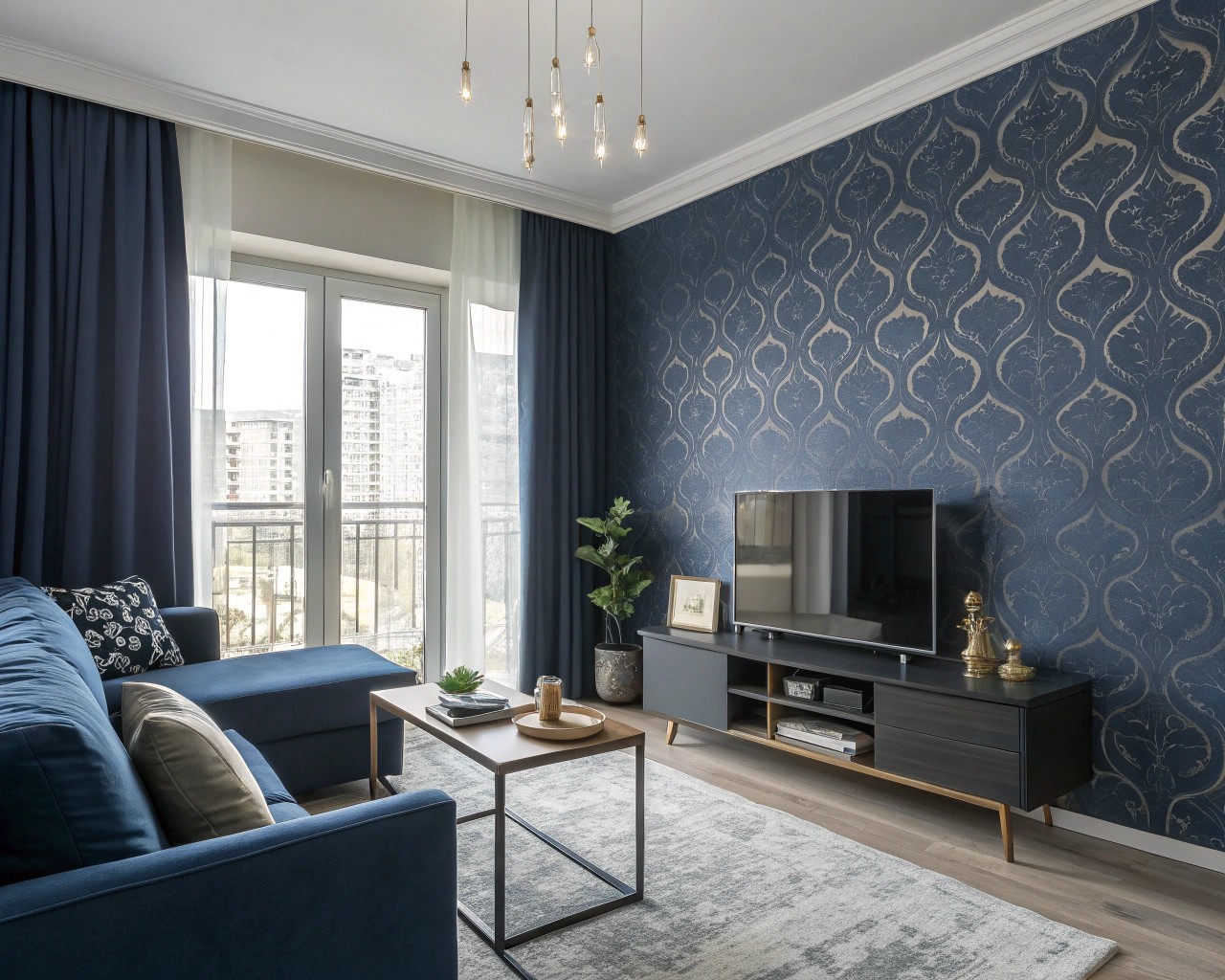
Deep, saturated colors like emerald green, navy blue, and charcoal gray are being embraced for their ability to add sophistication and drama. These “moody and cozy tones” create spaces that feel elegant yet comfortable.
Sustainable Materials
Eco-friendly wallpapers made from sustainable materials and printed with non-toxic inks are gaining significant traction. This reflects growing consumer awareness of environmental impacts in home design.
Where Wallpaper Works Best: Room-by-Room Analysis
Living Rooms
The living room offers numerous opportunities for wallpaper integration. You can transform the space through various application techniques:
Feature Wall Approach: Apply wallpaper to a single wall to create a focal point. This works especially well behind major furniture pieces like sofas or media units.
Complete Room Application: For a cohesive, enveloping feel, wallpaper all walls. This approach works particularly well with subtle textures or patterns that create atmosphere without overwhelming.
Ceiling Application: For an unexpected design element, consider wallpapering the ceiling. I recently completed a project where we applied a celestial pattern to the ceiling of a living room with high ceilings, creating a stunning effect that drew everyone’s eye upward.
Dining Rooms
Dining rooms have historically been popular spaces for wallpaper, and this tradition continues with fresh interpretations:
“Textured wallpapers such as grasscloth, linens, paper weaves, and raffias add a sense of warmth and create inviting spaces while elevating the overall design,” notes designer Alisa Popelka.
The dining room offers an opportunity for more dramatic expressions since it’s typically used for shorter periods than living spaces. Consider:
- Bold patterns that might be overwhelming in other rooms
- Rich, saturated colors that create intimacy
- Metallics that catch the light of candles or chandeliers
Bedrooms
In bedrooms, wallpaper can create a personalized sanctuary:
Master Bedrooms: Subtle textures and patterns in calming colors promote relaxation. Consider grasscloth or silk wallcoverings in natural tones.
Children’s Rooms: Playful patterns that can grow with the child. One recent client opted for a sophisticated botanical pattern in their tween daughter’s room, choosing a design that would transition well into teenage years.
Guest Bedrooms: Create memorable experiences for visitors with distinctive wallpapers that might be too bold for everyday living spaces.
Application Strategies and Their Impact
| Application Method | Best For | Visual Impact | Practical Considerations |
|---|---|---|---|
| Single Feature Wall | Small spaces, beginners to wallpaper | High contrast, focal point | More affordable, less commitment |
| Two Adjacent Walls | Defining zones in open floor plans | Medium impact, directional | Creates architectural interest |
| Three Walls (leaving one) | Large rooms that need dimension | Strong statement with balance | Works well when fourth wall has windows/doors |
| Complete Room | Creating immersive environments | Cohesive, enveloping experience | Best with subtle patterns or textures |
| Ceiling Only | Rooms with architectural interest | Unexpected, conversation starter | Draws the eye up, can make ceiling appear higher |
Client Case Study: The Reluctant Adopter
Sarah and Michael were adamantly against wallpaper when we first discussed their dining room redesign. “We remember the nightmare of removing my parents’ wallpaper in the ’90s,” Sarah explained. After showing them samples of modern removable options and textured grasscloths, they cautiously agreed to a subtle natural weave on a single wall.
The transformation was so impressive that they eventually expanded the wallpaper to all four walls and have since incorporated different wallpapers in their entryway and powder room. “I never thought I’d be a wallpaper person,” Sarah told me, “but the depth it adds is impossible to achieve with paint alone.”
Choosing the Right Wallpaper: A Practical Guide
Understanding Room Purpose and Light
The function of a room should guide your wallpaper selection. As designer Mina Lisanin advises, “Complement each room’s purpose with suitable wallpaper. Energizing patterns for active spaces and calming designs for bedrooms create a harmonious ambiance”.
Consider the natural and artificial light in your space. I always recommend testing samples in both morning and evening light conditions before making a final selection. A pattern that appears subtle in bright daylight might become dominant under evening lamp light.
Scale Considerations
The size of your room should inform pattern scale:
- Small rooms: Smaller patterns or textures prevent overwhelming the space
- Large rooms: Can handle larger patterns and bolder statements
- High ceilings: Vertical patterns can enhance height
- Low ceilings: Horizontal patterns can create a sense of width
The Five Essential Questions to Ask Before Selecting Wallpaper
- Longevity: How long do you plan to keep this wallpaper? (This affects quality and price point)
- Lifestyle: Does the room see heavy traffic or exposure to moisture?
- Coordination: What existing elements must the wallpaper complement?
- Light conditions: How does natural and artificial light affect the color and pattern?
- Installation method: Will you hire professionals or DIY?
Wallpaper Types: Choosing the Right Material
Modern wallpapers come in various materials, each with distinct advantages:
Vinyl Wallcoverings
Vinyl options generated the most revenue in 2022, largely due to their durability and easy-to-clean surface. They’re particularly suitable for:
- Kitchens: Resistant to splashes and can be wiped clean
- Bathrooms: Can withstand humidity and moisture
- High-traffic areas: More resistant to scuffs and damage
Nonwoven Wallpapers
These have become popular for digital printing applications and offer:
- Breathability: Less likely to trap moisture behind the wallpaper
- Dimensional stability: Less shrinking or expanding with temperature changes
- Easier removal: Often comes off in full strips without damaging walls
Natural Fiber Wallcoverings
These include grasscloth, sisal, jute, and other natural materials:
- Textural interest: Creates depth and warmth
- Environmental benefits: Often more sustainable
- Unique appearance: Each installation has natural variations making it one-of-a-kind
Sustainability in Wallpaper
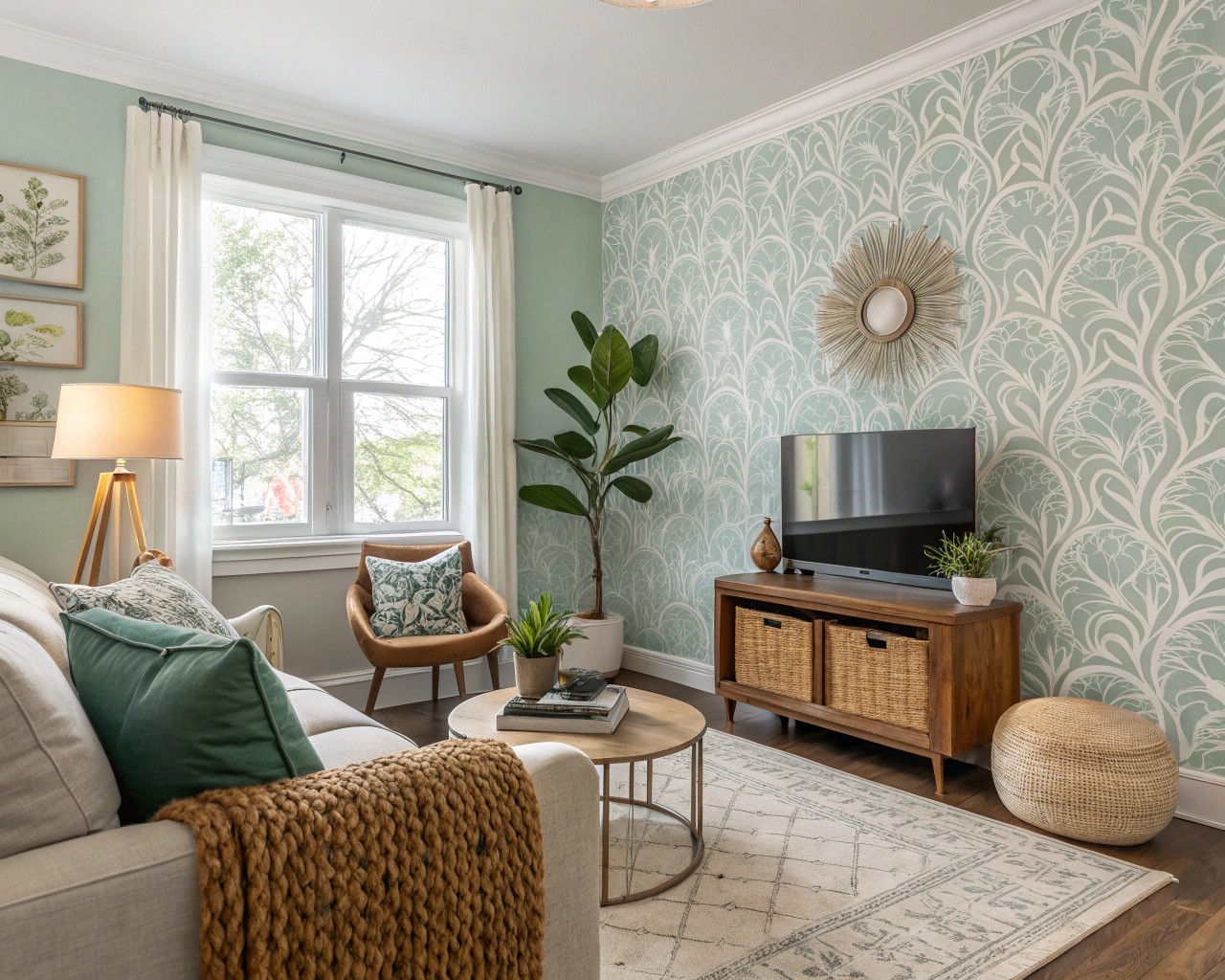
The growing focus on sustainable design has influenced wallpaper manufacturing. When working with environmentally conscious clients, I recommend looking for:
- Papers printed with water-based, non-toxic inks
- Wallcoverings made from renewable resources
- Products manufactured using energy-efficient processes
- Companies with transparent sustainability practices
Some manufacturers are now creating wallpapers from recycled materials or sustainably harvested fibers, offering beautiful designs with reduced environmental impact.
Botanical Wallpapers: A Timeless Trend
Among all wallpaper styles, botanical patterns have shown remarkable staying power. “Botanical designs have always been our best sellers maybe because of its biophilic design which still remains as a top trend this 2025”.
The appeal of botanical patterns lies in their versatility:
- Traditional interpretations: Classic floral patterns with historical references
- Modern abstractions: Stylized botanical elements in contemporary arrangements
- Photographic designs: Realistic depictions of plants, leaves, and natural elements
One particularly successful project involved transforming a home office with a large-scale botanical pattern featuring native plants. The wallpaper not only created a stunning visual impact but also improved the client’s sense of well-being and productivity in the space.
Common Wallpaper Mistakes to Avoid
In my years of practice, I’ve observed several recurring mistakes when clients select wallpaper:
- Choosing a pattern that’s too trendy: Select designs you’ll appreciate long-term
- Ignoring scale: Ensure the pattern size works with your room dimensions
- Overlooking lighting conditions: Patterns appear different under various light sources
- Forgetting about existing elements: Wallpaper should complement furniture and fixtures
- Skipping proper wall preparation: Even the finest wallpaper looks poor on improperly prepared surfaces

